2020中考英语考前错题本(P字母篇)教学设计
英语错题本

+1
+3
+6
+14
考前:
日期:+1
+3
+6
+14
考前:正解&分析
原题(可黏贴)易错题难题典型题常考题正解&分析
掌握情况:
错题分析:
拼写错误语法错误审题错误理解错误粗心大意用词不当完全不会
其它原因
所属知识点:
掌握情况:
错题分析:
拼写错误语法错误审题错误理解错误粗心大意用词不当完全不会
其它原因
所属知识点:
+1
+3
+6
+14
考前:
日期:+1
+3
+6
+14
考前:正解&分析
原题(可黏贴)易错题难题典型题常考题正解&分析
掌握情况:
错题分析:
拼写错误语法错误审题错误理解错误粗心大意用词不当完全不会
其它原因
所属知识点:
掌握情况:
错题分析:
拼写错误语法错误审题错误理解错误粗心大意用词不当完全不会
其它原因
所属知识点:。
2020中考英语考前错题本(U字母篇)教学设计

2020中考英语考前错题本(U字母篇)教学设计The teaching design of the wrong question bo ok (U letter) before the 2020 high school entr ance examination2020中考英语考前错题本(U字母篇)教学设计前言:小泰温馨提醒,英语作为在许多国际组织或者会议上都是必需语言,几乎所有学校选择英语作为其主要或唯一的外语必修课。
英语教学涉及多种专业理论知识,包括语言学、第二语言习得、词汇学、句法学、文体学、语料库理论、认知心理学等内容。
本教案根据英语课程标准的要求和针对教学对象是初中生群体的特点,将教学诸要素有序安排,确定合适的教学方案的设想和计划、并以启迪发展学生智力为根本目的。
便于学习和使用,本文下载后内容可随意修改调整及打印。
under[误] the lake is two meters under sea level.[正] the lake is two meters below sea level.[析] under的意思是在某物的下面,而below=lower than, 即"低于"。
[误] under the help of our teacher, all of us passed the exam.[正] with the help of our teacher, all of us passed the exam.understand[误] i think it is diffcult to make myself to understand.[正] i think it is diffcult to make myself understood.[析]这句话的意思是"我想让别人理解我太难了"。
[误] i am understanding the lesson now.[正] i understand the lesso n now.[析] understand一词没有进行时态。
2020中考英语考前错题本(C字母篇)教学设计
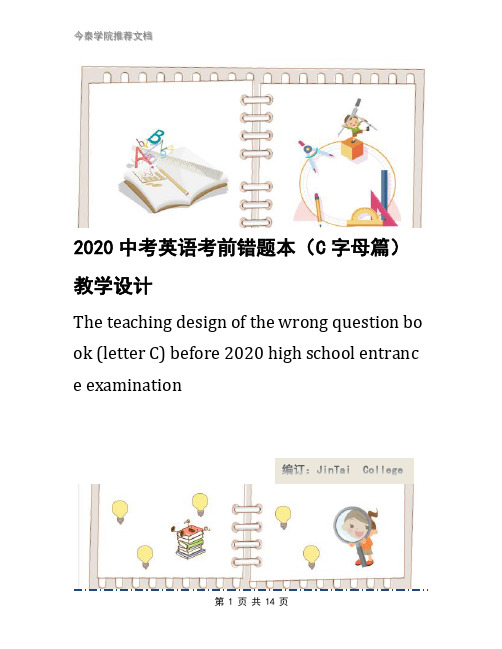
2020中考英语考前错题本(C字母篇)教学设计The teaching design of the wrong question bo ok (letter C) before 2020 high school entranc e examination2020中考英语考前错题本(C字母篇)教学设计前言:小泰温馨提醒,英语作为在许多国际组织或者会议上都是必需语言,几乎所有学校选择英语作为其主要或唯一的外语必修课。
英语教学涉及多种专业理论知识,包括语言学、第二语言习得、词汇学、句法学、文体学、语料库理论、认知心理学等内容。
本教案根据英语课程标准的要求和针对教学对象是初中生群体的特点,将教学诸要素有序安排,确定合适的教学方案的设想和计划、并以启迪发展学生智力为根本目的。
便于学习和使用,本文下载后内容可随意修改调整及打印。
call[误] i'll call at mr brown.[正] i'll call on mr brown.[误] i'll call on mr brown's home.[正] i'll call at mr brown's home.[析]作"拜访"讲时,at后面接访问地点,而on后面接访问的人。
call on drop in visitcall on比较正式的为公务的访问,如:we were called on by the old students. 而drop in则是比较随便的走走,顺便拜访,如:if you're free, drop in. 而visit则是更正式的外交访问或友好往来,如:my school's headmaster will visit america next week.can[误] a blind man can not judge colours.[正] a blind man cannot judge colours.[误] i cann't call for you at ten.[正] i can't call for you at ten.[析] can的否定形式应为cannot或can't.[误] it's only six o'clock. that mustn' t be the postman.[正] it's only six o'clock. that can't be the postman.[析] must用来表示一种肯定的推断,如:she must have some problems. she keeps crying. 但在否定句中则要用can't,要表示对过去的推测则要用"must+have+过去分词"的表达法,如:the lights have gone out.a fuse must have blown.而对过去的否定推测则多用"can't+have+过去分词",如:i don't think he can have heard you. call again.[误] we could not help to laugh at once.[正] we could not help laughing at once.[正] we could not help but laugh at once.[析] "couldn't help+动名词"表示禁不住做了某事。
中考英语考前错题本
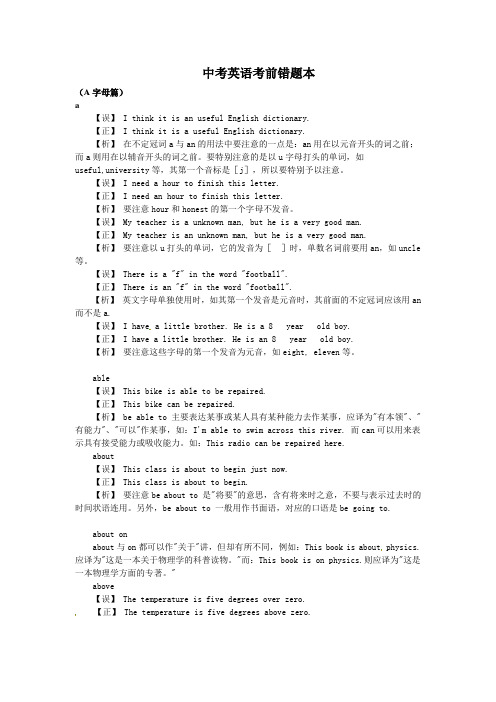
中考英语考前错题本(A字母篇)a【误】 I think it is an useful English dictionary.【正】 I think it is a useful English dictionary.【析】在不定冠词a与an的用法中要注意的一点是:an用在以元音开头的词之前;而a则用在以辅音开头的词之前。
要特别注意的是以u字母打头的单词,如useful,university等,其第一个音标是[j],所以要特别予以注意。
【误】 I need a hour to finish this letter.【正】 I need an hour to finish this letter.【析】要注意hour和honest的第一个字母不发音。
【误】 My teacher is a unknown man, but he is a very good man.【正】 My teacher is an unknown man, but he is a very good man.【析】要注意以u打头的单词,它的发音为[ ]时,单数名词前要用an,如uncle 等。
【误】 There is a "f" in the word "football".【正】 There is an "f" in the word "football".【析】英文字母单独使用时,如其第一个发音是元音时,其前面的不定冠词应该用an 而不是a.【误】 I have a little brother. He is a 8 year old boy.【正】 I have a little brother. He is an 8 year old boy.【析】要注意这些字母的第一个发音为元音,如eight, eleven等。
able【误】 This bike is able to be repaired.【正】 This bike can be repaired.【析】 be able to 主要表达某事或某人具有某种能力去作某事,应译为"有本领"、"有能力"、"可以"作某事,如:I'm able to swim across this river. 而can可以用来表示具有接受能力或吸收能力。
(九年级英语教案)中考英语考前错题本(M字母篇)
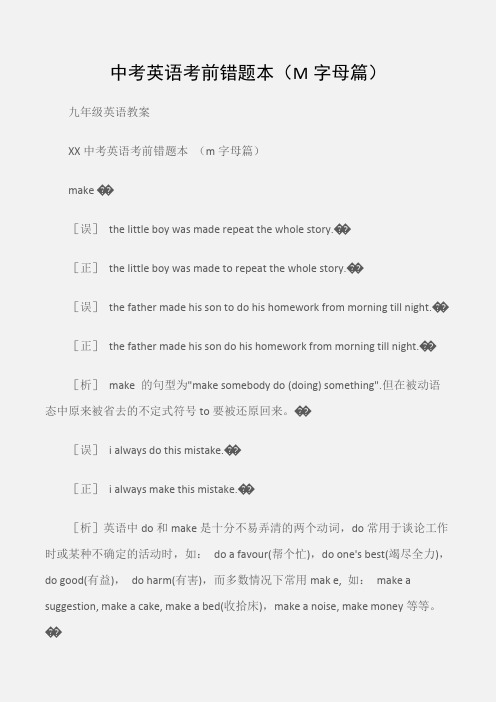
中考英语考前错题本(M字母篇)九年级英语教案XX中考英语考前错题本(m字母篇)make ��[误]the little boy was made repeat the whole story.��[正]the little boy was made to repeat the whole story.��[误]the father made his son to do his homework from morning till night.��[正]the father made his son do his homework from morning till night.��[析]make 的句型为"make somebody do (doing) something".但在被动语态中原来被省去的不定式符号to要被还原回来。
��[误]i always do this mistake.��[正]i always make this mistake.��[析]英语中do和make是十分不易弄清的两个动词,do常用于谈论工作时或某种不确定的活动时,如:do a favour(帮个忙),do one's best(竭尽全力),do good(有益),do harm(有害),而多数情况下常用mak e, 如:make a suggestion, make a cake, make a bed(收拾床),make a noise, make money等等。
��[误]this wine was made of grapes.[正]this wi ne was made from grapes.��[析]当成品制成后,其原料的性质有所改变时应用make from,否则用make of,如:this door was made of iron.��[误]hard work can often make up a lack of intelligence.��[正]hard work can often make up for a lack of intelligence.��[析]make up是"创造"、"编织",而make up f or是"弥补……的不足之处"。
英语错题本范本教学文稿

英语错题本范本For personal use only in study and research; not for commercial use初中生应该如何正确地做英语错题本(2012-11-08 15:13:29)转载▼标签:乐加乐学而思英语初中教育2011年4月,我带的第一届学生正在为2个月后的中考做最后的冲刺。
那时候的孩子们,实在是让人不忍苛责。
他们成绩有高有低,但大都非常焦虑。
初中英语那点知识早就已经学完了,连复习都已经进入到第三遍,正可谓“翻开书一目了然,合上书一片茫然”。
他们每天都要做很多题,因为他们除了做题没什么别的可以做。
每天一套模拟题,分数高一点,就非常开心,仿佛这预示着自己中考的分数也会高一点;分数低一点,那么,是时候再来一套了!我将这种状态称为“模拟题狂热症”,这是在考前冲刺的最后阶段极容易陷入的一个状态。
但是,也有少数孩子非常“淡定”,每天忙而不乱,有条不紊地进行着知识的整理和总结,最后取得了很好的效果。
为什么他们这么淡定?就是因为他们做了错题本。
一个小小的本子能有这么大的作用吗?是的。
在冲刺阶段,大家的知识水平都已经差不多,就看谁有方向,谁更淡定,谁能够脚踏实地地学习。
而错题本能清楚地展示出孩子的知识漏洞所在,帮助孩子明确最后阶段的复习方向。
错题本这件事,早做比晚做强,晚做也比不做强。
即便到考前最后10天,踏踏实实地整理一下错题,也比盲目地东看一眼、西碰一下有效得多。
而从学习的开始阶段就养成做错题本的习惯,对孩子的发展更是大有裨益。
这次我们给孩子们设计这个英语笔记本+错题本(前面一半是笔记本,后面一半是错题本),就是希望帮助孩子们养成这个习惯。
那么,错题本应该怎么做呢?不同类型的题目应该怎么处理?在这里,我把英语题目分两个类型来说明。
1.语法题(包括单项选择、句型转换等题型)这类题目往往较短,整理起来较为轻松。
比较好的做法是,在一页纸的左侧记录题目(黑笔),右侧记录错误答案和正确答案(红笔)。
中考复习英语教案七篇

中考复习英语教案七篇中考复习英语教案精选篇1一、教学设计思路将课文内容与多媒体紧密结合,激发学生兴趣,设计活动,鼓励学生表达,使学生在轻松的氛围中掌握词汇、句型和相关知识。
二、教学目标(一)知识1.掌握如何谈论自己的爱好和询问他人的爱好:want,and,but,like,Doyouwantto…?Yes,Ido./No,Idon't.Whatkindofmovi esdoyoulike?Ilike…2.掌握相关的电影词汇:actionmovie,romance,thriller,comedy3.掌握一些品质形容词并能用之表达喜爱或讨厌某一事物的理由:fun,great,scary,funny,exciting,sad,Ithink…(二)能力能了解电影的基本知识。
(三)情感培养、表达、交流自己的爱好。
三、教学重点谈论自己的爱好和询问他人的爱好:want,and,but,like,Doyouwantto…?Yes,Ido./No,Idon't.Whatkindofmovi esdoyoulike?Ilike…掌握一些品质形容词并能用之表达喜爱或讨厌某一事物的理由:fun,great,scary,funny,exciting,sad四、教学难点正确应用品质形容词:fun,great,scary,funny,exciting,sad五、教学媒体电脑,投影仪,课件(参考“优秀课件”)六、教学过程(一)巧妙导入为学生放一段电影片断,导入话题。
(参考“视频资源”)(二)结合生活,互动练习方法1:让学生观看电影片断,之后判断电影的类型,并表达对这类电影的好恶。
(参考“视频资源”)方法2:让学生观看一些电影的海报及图片,由学生说出电影的名字、种类及对电影的看法。
比一比谁是电影方面的专家。
中考复习英语教案精选篇2一、语言知识与技能1.根据读音规则和音标拼读单词。
2.理解和领悟词语的基本含义、语法项目以及语言形式的基本结构和常用表意功能;3.能在日常交际情景中听懂对话,例如,能听懂连续的指令并据此完成任务;能引出话题并进行几个回合的交谈;4.能听懂接近正常语速、熟悉话题的语段和简单故事,获取相关信息;5.能运用…..词汇和…..语言形式就熟悉的话题进行交谈;能运用…..词汇和…..语言形式及(或)所给提示描述人、物、事件、行为、特征等,表达简单的观点;6.能在教师的指导下进行简单的角色表演;7.能连贯、流畅地朗读课文;能从简单的文章中找出有关信息,理解大意;根据上下文猜测生词的意思;8.每天课外阅读量最少达到100词。
(九年级英语教案)中考英语考前错题本(VY字母篇)
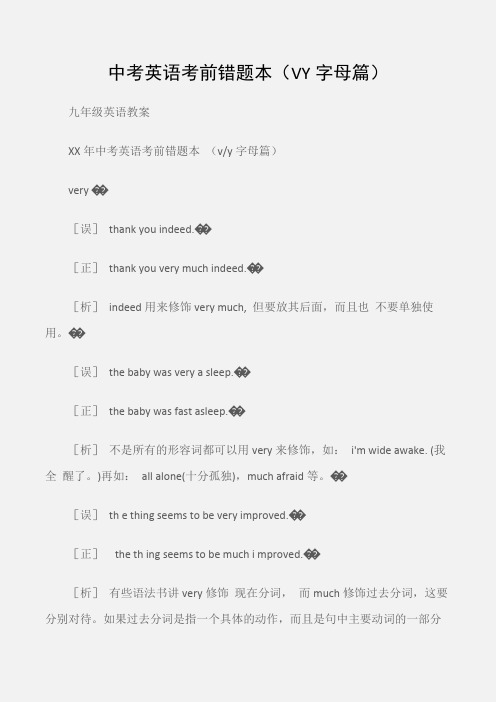
中考英语考前错题本(VY字母篇)九年级英语教案XX年中考英语考前错题本(v/y字母篇)very ��[误]thank you indeed.��[正]thank you very much indeed.��[析]indeed用来修饰very much, 但要放其后面,而且也不要单独使用。
��[误]the baby was very a sleep.��[正]the baby was fast asleep.��[析]不是所有的形容词都可以用very来修饰,如:i'm wide awake. (我全醒了。
)再如:all alone(十分孤独),much afraid等。
��[误]th e thing seems to be very improved.��[正]the th ing seems to be much i mproved.��[析]有些语法书讲very修饰现在分词,而much修饰过去分词,这要分别对待。
如果过去分词是指一个具体的动作,而且是句中主要动词的一部分就必须用much ,而某些形容词化的过去分词,还是要用very来修饰的,如:i am very tired.��[误]there is very less water in the rive r than usual.��[正]there is much/fa r less water in the river than usual.[析]very不能修饰形容词或副词的比较级,而要用far, much等来修饰。
wait ��[误]tomorrow i will wait you at the bus stop.��[正]tomorrow i will wait for you at the bus stop.��[析]wait是不及物动词,"等人"要用wait for somebody;而wait up为"不睡觉等候某事",如:i'll wait up tonight.��walk ��[误]i think she went a walk yesterday.��[正]i think she went out for a walk yesterday.��[析]散步在英文中要讲have a walk, take a walk.如果用go要用go for a walk.��want ��[误]the flowers want to water.��[正]the flowers want watering.��[析]want在这里作为"需要"讲,其后加动名词。
2020中考英语考前错题本(G字母篇)教学设计

2020中考英语考前错题本(G字母篇)教学设计The teaching design of the wrong question bo ok (G letter) before the 2020 high school entr ance examination2020中考英语考前错题本(G字母篇)教学设计前言:小泰温馨提醒,英语作为在许多国际组织或者会议上都是必需语言,几乎所有学校选择英语作为其主要或唯一的外语必修课。
英语教学涉及多种专业理论知识,包括语言学、第二语言习得、词汇学、句法学、文体学、语料库理论、认知心理学等内容。
本教案根据英语课程标准的要求和针对教学对象是初中生群体的特点,将教学诸要素有序安排,确定合适的教学方案的设想和计划、并以启迪发展学生智力为根本目的。
便于学习和使用,本文下载后内容可随意修改调整及打印。
game[误] he went to america to take part in theolympic game.[正] he went to america to take part in theolympic games.[析] game作为"运动会"讲时应用其复数形式,而具体一个游戏则可用其单数形式。
如:our school team won the game.german[误] they are germen.[正] they are germans.[误] she comes from german.[正] she comes from germany.[析] german是"德国人"、"德国的"、"德语",其复数形式是germans;而germany才是德国。
gather[误] all the students and teachers are gathered together now.[正] all the stud ents and teachers are gathered n ow.[析]用了动词gather就不要再用together了。
XX中考英语考前错题本(I,J,K字母篇)

XX中考英语考前错题本(I,J,K字母篇)XX中考英语考前错题本if[误]IfitillrainIon'tgotoschooltoorro.[正]IfitrainsIon'tgotoschooltoorro.[析]由if引起的状语从句要用一般时表示将来。
[误]Ianttonoifheesheretoorro.[正]Ianttonoifheilleheretoorro.[析]if所引起的如果是宾语从句则不能用一般现在时表示将来。
[误]Ianttonoifitillraintoorroheilleornot.[正]Ianttonoifitrainstoorroheilleornot.[析]这里的if从句是整个宾语从句的条件状语,所[:Z.xx..]ill[误]Hespentanyyearslooingafterhisillfather.[正]Hespentanyyearslooingafterhissicfather.[析]ill和sic都可以作表语,如:I'ill.美国英语中常用sic,而英国英语中两者都可用,但ill一般不作定in[误]Inacoldorning,Ienttoschoolalone.[正]onacoldorning,Ienttoschoolalone.[析]在intheorning或intheafternoon词组中,不论在这两个名词的前或后加任何修饰词,其介词in都要变为on.[误]Iillfinishitaftertodays.[正]Iillfinishitintodays.[析]中文中几天以后可以完成,或几天后来取,在译为英文时都不要用after,而要用in.如:Heillbebacinafedays.ininto作为副词应用in,而不能用into,如:ein,please.又若在句中不涉及到动词的位置,只是表达空间的位置时用in,如:Theteacherintheofficeisyother.但在go,run,e,al,dive等词后则要用into.如:Shedivesintotheriver.instead[误]Theboystayedinbedalldayinsteadtogotoschool.[正]Theboystayedinbedalldayinsteadofgoingtoschool.[析]insteadof其后要接动名词、名词或代词,而不能用不定式,如:Ichoosethisbooinsteadofthatone.[误]Thebeerhereisnotgood,soIdrinineinsteadofit.[正]Thebeerhereisnotgood,soIdrinineinstead.[析]instead是副词,而insteadof是介词短语。
(九年级英语教案)中考英语考前错题本(T字母篇)
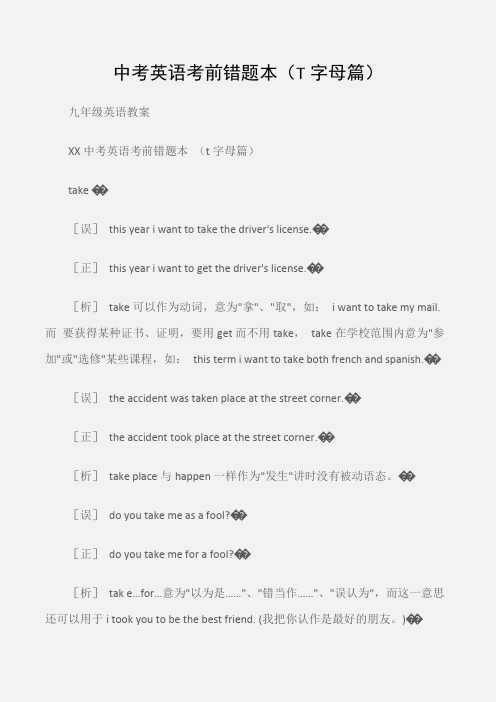
中考英语考前错题本(T字母篇)九年级英语教案XX中考英语考前错题本(t字母篇)take ��[误]this year i want to take the driver's license.��[正]this year i want to get the driver's license.��[析]take可以作为动词,意为"拿"、"取",如:i want to take my mail. 而要获得某种证书、证明,要用get而不用take,take在学校范围内意为"参加"或"选修"某些课程,如:this term i want to take both french and spanish.��[误]the accident was taken place at the street corner.��[正]the accident took place at the street corner.��[析]take place与happen一样作为"发生"讲时没有被动语态。
��[误]do you take me as a fool?��[正]do you take me for a fool?��[析]tak e…for…意为"以为是……"、"错当作……"、"误认为",而这一意思还可以用于i took you to be the best friend. (我把你认作是最好的朋友。
)��[误]myEnglishteacher was ill. who will take place her?��[正]myEnglishteacher was ill. who will take the place of her?��[析]take the place of…意为"取代"。
初中英语《中考语法填空专题复习》优质教学设计、教案
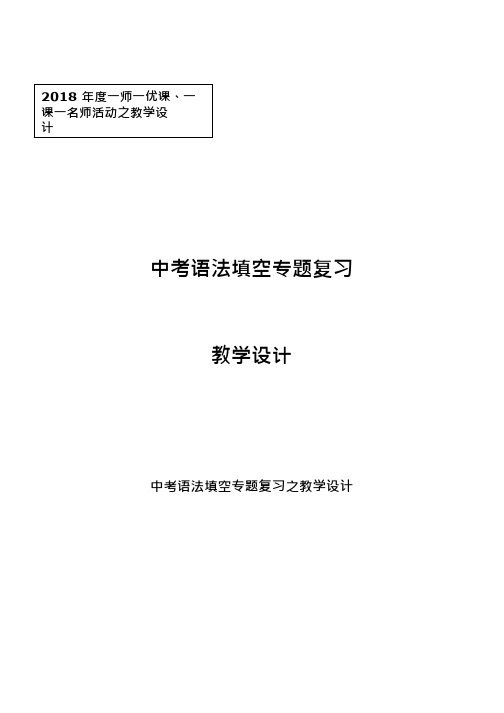
中考语法填空专题复习教学设计中考语法填空专题复习之教学设计2018 年度一师一优课、一课一名师活动之教学设 计1.Teaching objects:Knowledge objects:(1)Enable the students to learn the features of grammatical filling.(2)Get the students to grasp the usage of some words and sentence structures.Ability objects:Enable the students to use the skills and grasp sentence structures further.Moral objects:Help students build their confidence in English. Improve their learning capacity, cooperation ability and innovation ability.2.Teaching important points:(1)Grasp the skills of grammatical filling and learn to analyze sentence structures.(2)How to grasp and use the skills and improve students’learning capacity, cooperation ability and innovation ability.3.Teaching aids:Multi-media computer.4.Teaching proceduresStep 1: Lead-inGreeting and group students into 3 groups: group noun, group verb and group adjective.Show a video about parts of speech to students. The video was made by a student. Let other students know more about parts of speech.(设计意图:通过让学生自己制作介绍英语十大词类的微课,培养学生独立思考的能力和创新能力等关键能力,树立榜样示范的作用,也引起了学生学习兴趣。
人教版中考英语专题复习《词汇句型易混易错知识点》教学设计
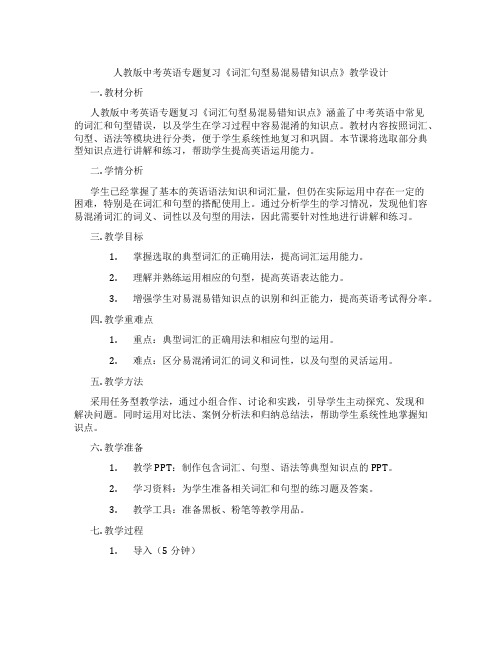
人教版中考英语专题复习《词汇句型易混易错知识点》教学设计一. 教材分析人教版中考英语专题复习《词汇句型易混易错知识点》涵盖了中考英语中常见的词汇和句型错误,以及学生在学习过程中容易混淆的知识点。
教材内容按照词汇、句型、语法等模块进行分类,便于学生系统性地复习和巩固。
本节课将选取部分典型知识点进行讲解和练习,帮助学生提高英语运用能力。
二. 学情分析学生已经掌握了基本的英语语法知识和词汇量,但仍在实际运用中存在一定的困难,特别是在词汇和句型的搭配使用上。
通过分析学生的学习情况,发现他们容易混淆词汇的词义、词性以及句型的用法,因此需要针对性地进行讲解和练习。
三. 教学目标1.掌握选取的典型词汇的正确用法,提高词汇运用能力。
2.理解并熟练运用相应的句型,提高英语表达能力。
3.增强学生对易混易错知识点的识别和纠正能力,提高英语考试得分率。
四. 教学重难点1.重点:典型词汇的正确用法和相应句型的运用。
2.难点:区分易混淆词汇的词义和词性,以及句型的灵活运用。
五. 教学方法采用任务型教学法,通过小组合作、讨论和实践,引导学生主动探究、发现和解决问题。
同时运用对比法、案例分析法和归纳总结法,帮助学生系统性地掌握知识点。
六. 教学准备1.教学PPT:制作包含词汇、句型、语法等典型知识点的PPT。
2.学习资料:为学生准备相关词汇和句型的练习题及答案。
3.教学工具:准备黑板、粉笔等教学用品。
七. 教学过程1.导入(5分钟)利用PPT展示一些常见的英语词汇和句型,引导学生回顾已学过的知识点。
同时提问学生:“你们在学习英语过程中,有哪些词汇和句型容易混淆?”让学生发表自己的看法。
2.呈现(10分钟)针对学生提出的易混易错知识点,通过PPT展示典型例子,进行讲解和分析。
如:词汇的词义、词性以及句型的用法等。
同时,引导学生进行讨论,分享自己的心得体会。
3.操练(10分钟)将学生分成小组,每组完成一份练习题。
练习题包括词汇填空、句型转换等类型。
九年级英语教案2019中考考前错题本(C字母篇)

2019中考英语考前错题本(C字母篇)XX中考英语考前错题本(c字母篇)call[误] i'll call at mr brown.[正] i'll call on mr brown.[误] i'll call on mr brown's home.[正] i'll call at mr brown's home.[析]作"拜访"讲时,at后面接访问地点,而on后面接访问的人。
call on drop in visitcall on比较正式的为公务的访问,如:we were called on by the old students. 而drop in则是比较随便的走走,顺便拜访,如:if you're free, drop in. 而visit则是更正式的外交访问或友好往来,如:my school's headmaster will visit america next week.can[误] a blind man can not judge colours.[正] a blind man cannot judge colours.[误] i cann't call for you at ten.[正] i can't call for you at ten.[析] can的否定形式应为cannot或can't.[误] it's only six o'clock. that mustn' t be the postman.[正] it's only six o'clock. that can't be the postman.[析] must用来表示一种肯定的推断,如:she must have some problems. she keeps crying. 但在否定句中则要用can't,要表示对过去的推测则要用"must+have+过去分词"的表达法,如:the lights have gone out.a fuse must have blown.而对过去的否定推测则多用"can't+have+过去分词",如:i don't think he can have heard you. call again.[误] we could not help to laugh at once.[正] we could not help laughing at once.[正] we could not help but laugh at once.[析] "couldn't help+动名词"表示禁不住做了某事。
2020年度人教出版中考~英语九年级~英语总复习预习教学教案教学教程

2018年人教版中考英语九年级英语总复习教案课时授课计划授课日期___年___月___日星期___课时授课计划授课日期___年___月___日星期___课时授课计划授课日期___年___月___日星期___课时授课计划授课日期___年___月___日星期___课时授课计划授课日期___年___月___日星期___课时授课计划授课日期___年___月___日星期___课时授课计划授课日期___年___月___日星期___sun-______ , cloud-______, snow-______ ,rain-______ 同义词_______, fog- ______, wind-______.It’s rainy. 同义句:There ________________ . 或It ___________________ .4.I’m pretty good ! 我很好!划线部分提问______ it ________? :你怎么样?(两人见面时)同义句:How____________________________ ?5. Some are taking photos, others are lying on the beach .一些人正在拍照, 另一些正躺在沙滩上。
Some … others …一些…, 另一些…造句:易混淆词组:1)one…the other … (两者中)一个…另一个…造句:2)another (三个或更多中的)另一个造句:6. I am surprised they can play in this heat . 是我吃惊的是他们能在这么热的天打排球。
1) be surprised at sth. 吃惊于某事…造句:2)be surprised to do sth . 吃惊的做…造句:3)to one’s surprised 是某人吃惊的是造句:III. 练习词汇1. It’s _______ / / (hotter) today than yesterday .2. She likes taking part in many different __________ /æk't v t z/.3. How was the ________/'weðə/ yesterday ?4. He ________ /'st d d/(studied) for the math test.5. Yesterday she bought two __________/ska:vz/ for her daughter .选择1. _________ ?It’s raining .A. What is itB. How is it goingC. What’s the weather like2. Some students like math, and ______ like English .A. othersB. the otherC. the others3. Mr Green _____ for Tokyo tomorrow .A. is leavingB. leavesC. is leaveD. leave4. _____ ? I’m reading newspapers.A. Where’re youB. What do you doC. What’re you doingD. How are you doing5. It’s pretty __ . Loot at the heavy snow !A. hot B. cool C. warm D. cold 翻译1. 有些学生在拍照,有些正躺在沙滩上Some students are _______ _______ and _______ ______ ______ on the beach.2. 我吃惊的看到大热的天他竟然在生火。
九年级英语教案2020中考考前错题本(s字母篇)
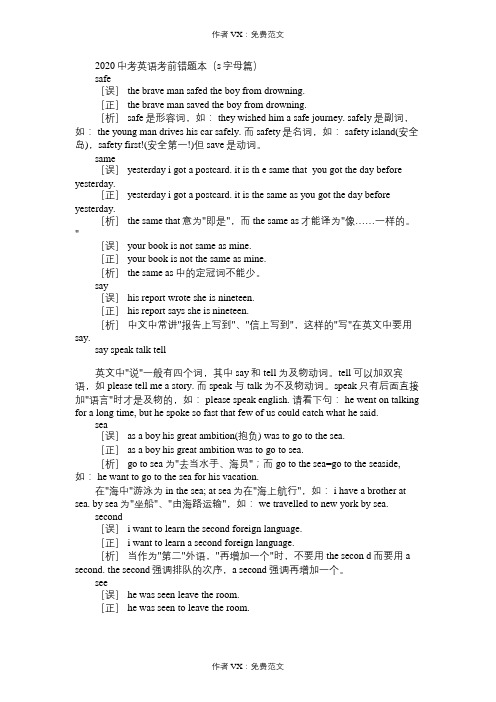
2020中考英语考前错题本(s字母篇)safe[误] the brave man safed the boy from drowning.[正] the brave man saved the boy from drowning.[析] safe是形容词,如: they wished him a safe journey. safely是副词,如: the young man drives his car safely. 而safety是名词,如: safety island(安全岛),safety first!(安全第一!)但save是动词。
same[误] yesterday i got a postcard. it is th e same that you got the day before yesterday.[正] yesterday i got a postcard. it is the same as you got the day before yesterday.[析] the same that意为"即是",而the same as才能译为"像……一样的。
"[误] your book is not same as mine.[正] your book is not the same as mine.[析] the same as中的定冠词不能少。
say[误] his report wrote she is nineteen.[正] his report says she is nineteen.[析]中文中常讲"报告上写到"、"信上写到",这样的"写"在英文中要用say.say speak talk tell英文中"说"一般有四个词,其中say和tell为及物动词。
- 1、下载文档前请自行甄别文档内容的完整性,平台不提供额外的编辑、内容补充、找答案等附加服务。
- 2、"仅部分预览"的文档,不可在线预览部分如存在完整性等问题,可反馈申请退款(可完整预览的文档不适用该条件!)。
- 3、如文档侵犯您的权益,请联系客服反馈,我们会尽快为您处理(人工客服工作时间:9:00-18:30)。
2020中考英语考前错题本(P字母篇)教学设计The teaching design of the wrong question bo ok (P letter) before the 2020 high school entr ance examination2020中考英语考前错题本(P字母篇)教学设计前言:小泰温馨提醒,英语作为在许多国际组织或者会议上都是必需语言,几乎所有学校选择英语作为其主要或唯一的外语必修课。
英语教学涉及多种专业理论知识,包括语言学、第二语言习得、词汇学、句法学、文体学、语料库理论、认知心理学等内容。
本教案根据英语课程标准的要求和针对教学对象是初中生群体的特点,将教学诸要素有序安排,确定合适的教学方案的设想和计划、并以启迪发展学生智力为根本目的。
便于学习和使用,本文下载后内容可随意修改调整及打印。
XX中考英语考前错题本(p字母篇)paper[误] please give me two letter papers.[正] please give me two sheets of letterpaper.[析] paper作为纸讲为不可数名词。
[误] each student must write paper on what he learned.[正] each student must write a paper on what he learned.[析]这里的paper作为论文讲,是可数名词。
paper的这种用法还可以用于证件、报纸、考卷等。
parent[误] my parents and i are both interested infootball.[正] my parents and i are all interested in football.[析] parents即为父母、双亲,指两个人,加上自己为三个人,所以只能用all而不能用both.pass[误] the ship pasted the channel.[正] the ship passed the channel.[析] pass为动词,而past则为副词,不要混淆,如:my father has been ill for the past two weeks. all the students passed the exam.pay[误] please help me do this job, and i will payfor you later.[正] please help me do this job and i will pay you later.[析]为某工作付给工人工资应为pay somebody, 而pay for something是为某物付款,如: you can buy all the things you want. i'll pay for those.people[误] there are five h undred peoples here.[正] there are five hundred people here.[误] there is only one people.[正] t here is only one person.[误] people there is friendly.[正] people there are friendly.[析] people作为人讲时为复数名词,如要讲一个人应用one person, 而不能用people, 讲若干人时用people而不能加s,这样的用法还有police(警察)等,这些概念用单数时要换其他的词. 如: people- a person; police-policeman policewoman; youth-a young man/woman.picture[误] there are some spots in the picture.[正] there are some spots on the picture.[误] there is a young woman on the picture.[正] there is a young woman in the picture.[析]指溅落在画面上的灰尘,污物是on the picture,即讲与画面内容无关的东西用on,而in the picture用于讲画面的内容。
pity[误] what pity that her mother must alwayssuffer![正] what a pity that her mother must alwayssuffer![析] pity作为遗憾之事讲常加不定冠词;但要注意作为同情、怜悯讲则不加冠词,为不可数名词,如: i feel pityfor you. 它还可以用作动词,如: he pitied the poor people.[误] i have pity for you.[正] i have pity on you.[析]可怜某人时应用have (take) pity on somebody,这是个惯用法。
place[误] last year he went to america. he travelledfrom place to another.[正] last year he went to america. he travelledfrom place to place (from one place to another).[析]到处译为英文时为from place to place请不要在place之前加冠词。
这种用法在有些语法书中叫作零冠词用法,如:一户挨一户为door by door,手拉手为hand in hand.[误] the accident was taken place in that street.[正] the accident took place in that street.[析] take place为发生,它不能用于被动态,这样的词还有happen等。
[误] there is no place in the bus.[正] there is no room in the bus.[析] room这里为不可数名词,意为空间,即没有地方了。
place多指场所所在之地。
[误] i came here to take place of mr smith.[正] i came here to take the place of mr smith.[析] take the place of 意为代替、取代某人某事。
play[误] do you want to play guitar?[正] do you want to play the guitar?[误] i like t o play the bridge.[正] i like to play bridge(桥牌).[析] play作为玩讲时,在各种乐器前要加冠词,在各种体育运动前则没有冠词。
please[误] my friend pleased me to his birthday party yesterday.[正] my friend invited me to his birthday party yesterday.[析] please作为动词时其词义不是请,而是高兴、愿意等意,如: she always does what she pleases. (她总是想做什么就做什么。
)又如: it's hard to please all. 而please 作为请讲时为语气词,多用于祈使句中,如: please comein.[误] both the teacher and the mother were pleasedto the little girl.[正] both the teacher and the mother were pleased with the little girl.[析]对某人表示满意、喜欢,应用be pleased with somebody. 对某事感到高兴和满意时多用be pleased at或about,但有时也可用with,却不能用of.pleasure[误] the boy gave his parents a lot ofpleasures.[正] the boy gave his parents a lot of pleasure.[析] pleasure作为高兴、愉快、享乐、娱乐讲时为不可数名词。
[误] it is pleasure to work with you.[正] it is a pleasure to work with you.[析] pleasure作为一件或某件乐事、高兴之事讲时为可数名词,如: it is one of my pleasures.police[误] the police has not found the cause of the accident.[正] the police have not found the cause of theaccident.[析] police为复数名词,它没有单数形式。
如果要讲一个警察要用a policeman,两个要用two policemen,或a policewoman, two policewomen.prepare[误] i'm preparing the exam.[正] i'm preparing for the exam.[误] we'll return in time for you to prepare for dinner.[正] we'll return in time for you to prepare dinner.[析] prepare既是及物动词,又是不及物动词。
作及物动词时其后面所跟的事物是正在准备的;而作不及物动词时for 后面的事物是目标。
如: i'm preparing for the exam. 应译为我正在为考试做准备。
同样的用法还有search与search for.present[误] don't worry. i can present the meeting.[正] don't worry. i can be present at the meeting.[析] present作为出席、在场讲时,是形容词而不应用作动词。
